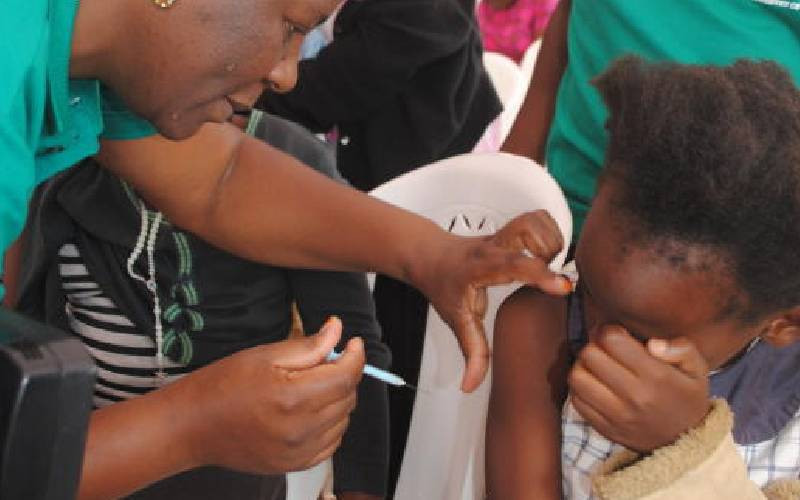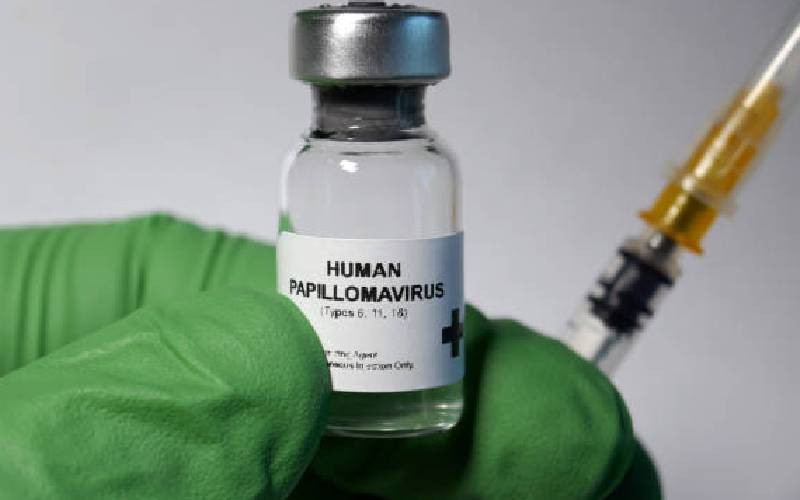
I learnt of Catherine Kasavuli's battle with cervical cancer with a lot of apprehension. I think we - the audience that spend years adoring personalities like Ms Kasavuli - never quite expect such news.
As a doctor though I have a good grasp of man's susceptibility to ill health. In Kenya, cervical cancer is the leading cause of cancer deaths amongst women. I handle hundreds of cervical cancer patients at Texas Cancer Centre. So, I know that cervical cancer can affect any woman; even celebrities.
Kasavuli is a strong lady and I have no doubt in my mind that she can beat this disease.
As I read the news, I couldn't help but think about cervical cancer and the fact that it is entirely preventable. HPV vaccine can prevent most cases of cervical cancer if it is given before girls or women are exposed to the virus.
Yes, you heard me right: cervical cancer is preventable. It is one among very few cancers that scientists have thoroughly studied and developed a solution for.
President Uhuru Kenyatta launched the HPV vaccine on October 18, 2019, targeting young girls aged between 10 and 15 years.
The vaccine has been tested and approved in the developed world. It is top quality. It has always been my advice to many parents with young girls to take their children for the vaccine. But, judging from data emerging from the vaccination exercise, uptake has been sub-optimal with only 33 per cent of targeted population receiving the first dose in 2020 and 16 per cent returning for the second dose.
Why is that? Given, the decision to get vaccinated rests with parents, I think the problem is that many parents do not trust the vaccine. Or, they believe (I would say wrongly) that giving their daughter the vaccine would be akin to allowing them to engage in premarital sex.
- Kool The Gang drummer George 'Funky' Brown dies at 74
- Former Sultana actress Dida seeks help with Cancer treatment funds
Keep Reading

Cancer remains largely mysterious. In majority of the cases, it is impossible to tell what exactly caused cancer in a patient. We have however established, based on research, that cancer is linked to particular factors such as bad lifestyle habits - drinking (alcohol), smoking and fast-food diet.
Others include exposure to radioactive material, Ultra Violet rays, heavy metals in our water or through the food we eat, and genetics, just to name a few. Infection with viruses is another factor in development of cancer.
Cervical cancer is caused by Human papillomavirus or HPV. Research shows that the virus is responsible for 99.7 per cent of all cervical cancers. In other words, if you ever get diagnosed with cervical cancer, it is highly likely that it resulted from HPV infection.
The age at which HPV vaccine is administered is critical because the vaccine works best when the recipient has not yet been exposed to HPV. The virus, like HIV, is sexually transmitted. Chances are that girls aged 10-15 haven't been sexually active and therefore not exposed to the virus. The last time I checked (KDHS 2014), 15 per cent (women) and 21 per cent (men) have had sex by age 15 in Kenya.
A study by Cancer Research UK (United Kingdom), released in November 2021, found reduction in cervical cancer rates of 34 per cent for those who got the vaccine aged 16-18, 62 per cent for the ones jabbed at 14-16 years, and 87 per cent for those injected aged 12-13, compared with unvaccinated cohorts. You see how the age at vaccination correlates with chances of infection with the virus? And ultimately the cancer?
HPV causes cancer by changing the genetic make-up of healthy cells over a long period of time. Fifteen to 20 years according to World Health Organisation (WHO). In women with weakened immune systems - such as those with untreated HIV - it can take only five
There aren't any clear numbers on prevalence of HPV among Kenyan women. However, from my experience as a doctor, chances are very high that if you have been sexually active you most likely have been infected already. And, as long as you have the virus, it is only a matter of when - not if - it causes the cancer.
Fortunately, over 80 per cent of HPV infections are transient, asymptomatic and resolve spontaneously in two to three years due to the natural cell-mediated immunity, hence majority of women who get infected with high-risk oncogenic HPV types do not develop cervical cancer. Of the 20 per cent of infections that persist, the HPV viral gene is incorporated into the DNA of cervical cells stimulating abnormal cell division.

The challenges cervical cancer poses to Kenyans cannot be understated. In 2021, Kenya registered 5,236 new cases of cervical cancer and 3,211 deaths from it. That is 61 per cent fatality rate against new infections, averaging nine deaths per day. And these are only numbers that get captured through formal channels. I suspect, there are many more cases that don't even make it to hospital or don't even get diagnosed.
Now, we are a country that largely looks to those in power - whether through election or appointment - to solve problems bedeviling our society. We are a 'serikali saidia' people. On cervical cancer, I want to challenge us parents to help ourselves by making the right choices for our daughters; Kenya's future women and mothers.
Currently the vaccine is available for free at government health facilities. Prevention is better than cure. This is especially true because cancer is a disease that becomes more fatal with time.
I treat many cervical cancer patients. I have patients who have fully gone into remission. But I also have patients who came in when it was too late; when the cancer had grown and metastasised.
The vaccine therefore becomes a very vital part of the fight we have with the cancer. Believe me, you do not want your daughters to confront the reality of battling cervical cancer. It is grueling. It might need invasive surgery and long chemotherapy and radiotherapy sessions.
By the way, the vaccine can also prevent vaginal and vulvar cancer. In addition, the vaccine can prevent genital warts, anal cancers, and mouth, throat, head and neck cancers in women and men.
So, Kenyan parents, take your children for the HPV vaccine. You will be helping lower the burden of cervical cancer.
 The Standard Group Plc is a multi-media organization with investments in media
platforms spanning newspaper print
operations, television, radio broadcasting, digital and online services. The
Standard Group is recognized as a
leading multi-media house in Kenya with a key influence in matters of national and
international interest.
The Standard Group Plc is a multi-media organization with investments in media
platforms spanning newspaper print
operations, television, radio broadcasting, digital and online services. The
Standard Group is recognized as a
leading multi-media house in Kenya with a key influence in matters of national and
international interest.









